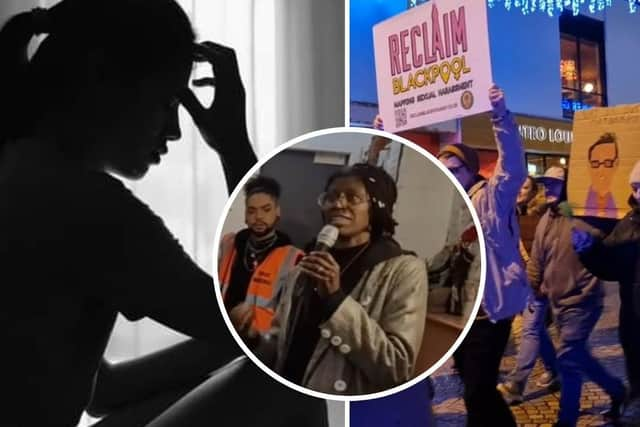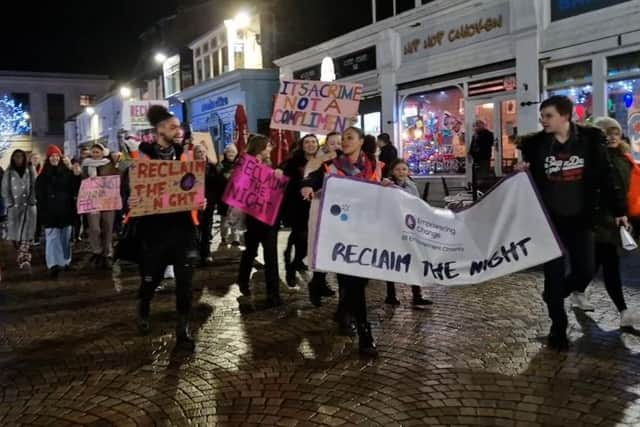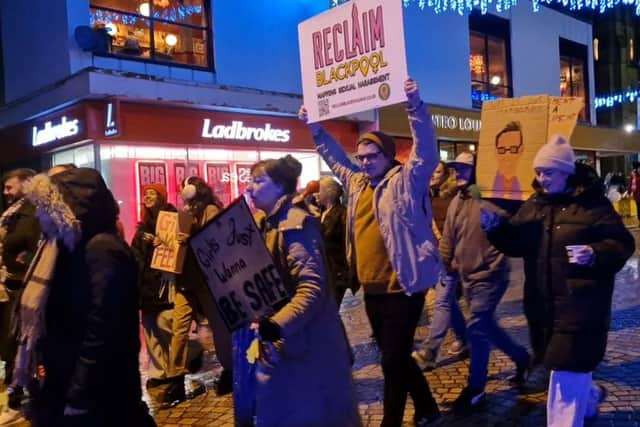Councillor highlights need to educate boys about respecting women by giving emotional speech about her domestic violence in her family
and live on Freeview channel 276
Coun Paula Burdess expressed the importance of having ‘difficult conversations’ in order to ‘break the cycle’ of abuse in the home.
The cabinet member for community safety told a room full of activists, that she still remembers witnessing domestic violence in her family.
Advertisement
Hide AdAdvertisement
Hide AdBut children need to be told that just because it’s happening, it doesn’t mean it is okay.


Speaking at the second annual ‘Reclaim The Night’ march, Coun Burdess said: “If you’re in the position where that’s the norm in your family, it’s a difficult to conversation to have...[but we] have to have that conversation, that it may be happening but it’s absolutely not ok.”
The former deputy mayor of Blackpool explained that honest conversations were vital to prevent the next generation from repeating the cycle of abuse.
“It sets the level that our children are going to accept in relationships for themselves”.
Advertisement
Hide AdAdvertisement
Hide AdActivists gathered at the Upside Down Cafe, on Cedar Square at 6pm – ready to make some noise and campaign for safer streets.


The family-friendly event also attracted a large number of men, as well as young children who had come prepared with their own placards.
Coun Burdess also highlighted the need to have the ‘male voice’ as part of the fight for a safer town for women and girls.
“We have to tell our children that it is not okay. The way we speak to each other and relate to each other is really important and we have to respect each others space and dignity.”
Advertisement
Hide AdAdvertisement
Hide AdThe councillor for levelling up people also shared her experience of casual everyday sexism in the street.


Coun Jo Farrell had recently told a meeting of the full council how she had received verbal abuse from a man in a passing car, while she was standing at a bus stop.
She said the cat calling incident, which included sexually suggestive language, had left her feeling shocked and angry, and had fuelled her determination to bring about zero tolerance for such behaviour.
“A couple of comments on social media said I was brave to speak up. I’m not brave at all. I’m just fed up. I’m so sick and tired, and I’m angry. 40 years I’ve been experiencing this behaviour and I’ve spent 40 years modifying my own behaviour to keep myself safe. It’s got to stop.”
Advertisement
Hide AdAdvertisement
Hide AdThe Reclaim The Night march was organised by Safer Streets co-ordinator Aviel Lowndes of Empowerment Charity.
They put across the message that it is the right of every woman to feel and be safe to walk the streets without fear of violence and harassment.
Stories of abuse against women, some as young as schoolchildren, are plotted on Blackpool’s Street Harassment Map.
Antonia Charlesworth-Stack also gave a few words about the Reclaim Blackpool Map, and read out some of the recent testimonies from victims of sexual harassment.
Advertisement
Hide AdAdvertisement
Hide AdThese included incidents of women being spiked in a town centre nightclub, and victims who received unwanted sexual attention while walking to their job at the library.
"It’s very significant that we are walking through Blackpool town centre because overwhelmingly, these are where these stories are reported. In the night-time economy. So, to be going out on a Friday night is brave but we have safety in numbers.”
In her report to the council, Coun Farrell said ensuring people felt safe was a key priority in levelling up Blackpool, with the focus on campaigns including #itstopshere, White Ribbon which raises awareness of domestic abuse, and the Green Dot campaign which urges people to intervene safely if they see harassment.
Green Dot is a prevention programme focusing on sexual assault, domestic abuse and harassment and is designed to make Blackpool a safer place for everyone.
Advertisement
Hide AdAdvertisement
Hide AdThe initiative forms part of the #ItStopsHere campaign, which is an ongoing national movement to help create a safer environment for women.
Using a community responsibility approach, the violence prevention strategy depends on the power of bystanders or witnesses to prevent violence and shift social and cultural norms.
An active bystander is someone who intervenes in a potentially dangerous situation, especially when it comes to violence. They may not be directly involved, but they do have the choice and opportunity to speak up and take action.
The ambition is to deliver the training in schools and colleges as well as to door staff, bar staff and taxi drivers around the town.
